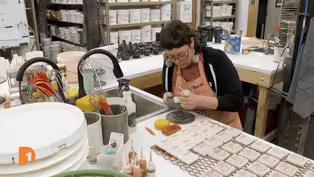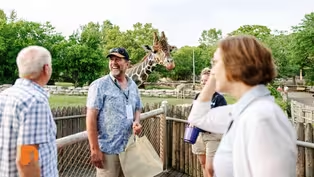
Michigan caregiving experts call for systemic changes to support caregivers
Clip: Season 9 Episode 51 | 9m 1sVideo has Closed Captions
Caregivers take center stage during a discussion hosted by Grantmakers in Aging and Detroit PBS.
As our population ages and care needs increase, the systems designed to support caregivers must evolve, experts say. During a recent panel conversation with Grantmakers in Aging and Detroit PBS, moderated by Senior Vice President of Production Fred Nahhat, local experts discussed caregiving and the systemic changes needed to better support caregivers.
Problems playing video? | Closed Captioning Feedback
Problems playing video? | Closed Captioning Feedback
One Detroit is a local public television program presented by Detroit PBS

Michigan caregiving experts call for systemic changes to support caregivers
Clip: Season 9 Episode 51 | 9m 1sVideo has Closed Captions
As our population ages and care needs increase, the systems designed to support caregivers must evolve, experts say. During a recent panel conversation with Grantmakers in Aging and Detroit PBS, moderated by Senior Vice President of Production Fred Nahhat, local experts discussed caregiving and the systemic changes needed to better support caregivers.
Problems playing video? | Closed Captioning Feedback
How to Watch One Detroit
One Detroit is available to stream on pbs.org and the free PBS App, available on iPhone, Apple TV, Android TV, Android smartphones, Amazon Fire TV, Amazon Fire Tablet, Roku, Samsung Smart TV, and Vizio.
Providing Support for PBS.org
Learn Moreabout PBS online sponsorship(pensive music) - You bring your life's experience in caregiving to the conversation.
So let's start with you.
You did begin at a very, very early age.
What moment in the screener really touched you?
What impacted you, and how did it differ or how was it similar to your own personal experience?
- Well, first of all, thank you so much for having me here.
I'm very excited to be here.
I think that it's so easy for me when I think about my caregiving journey and story to just think about 2019, where I became a caregiver for my mother at 23.
And I often forget about that I started at 14 years old when my father became ill and I was a freshman in high school, very similar to the young man in the film.
And I think that that title that was used in the end of being a caregiving student is something I didn't even think much about.
I am the daughter of older parents, so that journey did start very... a little bit sooner for myself.
But I think that ultimately, again, just resonated with the fact that so many, I'm not just the only one who had a caregiving journey that started so soon.
But also just having that title when you're the child yourself and how that overlaps with your childhood is such a fascinating experience.
I think, again, just getting comfortable with the title of being a caregiver is a big part of the journey, especially at a young age.
- Misha, you from the perspective of the foundation that you serve, you take an analytical look at needs in the community, and I want you to react to a moment in the film, but also take your orientation at a systems level.
What can be improved?
Where are the gaps?
How did it represent what you experience when you dig into these issues and make grants in the community about caregiving?
- At the Ralph C. Wilson, Jr. Foundation, we're very intentional about saying that we focus on the caregiver of older adults, not caregiving.
We're very intentional about centering the person and not their labor.
And so when you think about a systems, the systems, the systems prioritize the labor, they prioritize the quality of the labor, the time spent in the labor.
Are you full time?
Do they live with you?
Are you a part-time caregiver?
It's all about the statistic around like the value of the time spent caring, right?
And so for us, we are really looking for opportunities like this film and spaces like this to elevate that person.
For those of us who have social work degrees, we know all about person-centered planning, person-centered approaches.
That's what this work is really about for us and about helping to raise the stories of the caregiver, the visibilities of the caregiver, but also in reaching out and touching the caregiver, helping them to see themselves, and really living up to that idea that you gotta pour into your own cup before you can really pour into someone else's.
- Kristie, you are a social worker, but also lead this collaboration to improve services and deliver those.
React to a moment in the film that struck you, and how is it similar or different to reflect your own personal experience day-to-day?
- I think one thing, once again, thank you everyone as well.
A lot of partners are in the room, so thank you guys for being here.
One thing for me, I'm just gonna say that struck me that was a little different that I didn't expect was the history, the level setting they did with the history around caregiving.
Really thinking back of how long we've really been doing this journey, and how we've looked at it, how we've structured it, and how we're still in the same place.
I thought that was really ironic when we look at what Frances Perkins had actually written down.
We are actually in the exact same place we were 100 years ago.
And personally, for me, really looking at...
It was kind of, for me, I've been a caregiver.
My brother passed away a few years ago, but I was a caregiver for him off and on, part of a care team.
And so being part of that team made me kind of think about the young man, the freshman, because he had a young son who did a lot of that care in the house himself, who found my brother when he passed away.
And so thinking about that, and thinking about that experience, and just thinking about all the things that I didn't know that he may have been experiencing going to school every day, knowing that his dad was at home sick, kind of thinking through those pieces.
I was a sister, so I came in when he thought he needed me to come in if I was at the hospital or whatever that was.
So just thinking about that care experience over the years and how I've been in and out of it.
And now, with my parents being older and being in different places, just thinking about how that will actually impact my own life moving forward.
- Misha, a 30,000-foot view, like what...
If you had a top three, what are the three changes we could just implement?
If you could wave that magic wand and say, "Let's do this today, one, two three."
- If I could wave my magic wand, the first thing that I would change is the ability for all of our systems to talk directly to caregivers and about their needs without it having to be attached to the person that they care for.
Really, an example I use all the time is with health insurance plans.
So all of the services you can get through health insurance comes through the insurance of the person that you care for, as opposed to your own insurance.
Thinking about it, the way they think about smoking cessation or weight loss, and saying, "We know this is stressful, we know it will impact you down the line, so let's put it in the preventative care.
Let's put it in the behavioral health.
Let's make sure it's in all these spaces."
So, the first thing I would do is set up every system so that it could recognize the caregiver on their own and their needs.
And then another thing that I think is really important, and the film touched on this a little bit, is how our workplaces change.
And everything isn't about FMLA necessarily.
It's about managers and supervisors being prepared to talk to people about what their needs are, when they need to take that day to go take care of their father periodically.
It's about restructuring PTO so that you can say, "Yeah, we have to have these limited buckets of time, but here's a bucket that's just for caregiving roles."
Or your personal time doesn't have to be taken at half days.
You can take it two hours at a time, and you don't have to notify us 24 hours in advance, right?
So there are structural things that employers can do, whether you're a midsize, small, or large employer that is low lift and is honestly not incredibly expensive to adjust.
And then it allows caregivers to stay at work.
Like, a lot of folks are leaving the workplace and they don't want to.
But what else are you supposed to do?
- Damaris, give some advice to someone facing the same thing that you face.
Coach them up a little bit.
What would you tell them how to prepare for that?
I guess inevitability in so many ways.
- I would say definitely finding purpose in the work.
I have to talk about my faith in Christ Jesus as a big source of my hope and a big source of the reason why I do this every single day.
And for myself, I don't see caregiving, and it wasn't like this initially.
I saw it as, "I'm gonna take care, and then at some point, there are these other things that I wanna do that's gonna come into play."
And it wasn't until I found like, "No, caregiving is the preparation that I need to do these other things that I want in my life."
You know, staying organized and being strategic, whether it's me starting my own business or one advancing my career, those are skills.
So what are the transferable skills in that way?
So I would say, again, finding purpose and attachments to work, not separating it.
I'll also say owning the identity of a caregiver.
I didn't wanna call myself a caregiver for a very long time.
I've just warmed up to that about a year ago, if that.
But there is a joy and an honor in having that title.
So I would say those two things.
Accept the identity, find your peace, what amount of that identity you wanna take on.
And also to not see it as some separate aspect of your life, but the preparation that you need to achieve all the things that you want 'cause it teaches you so much about so many things.
- Kristie, final thought on that question just in general, and how to help.
- Yeah, I think the thing, the first thing that came to my thought was don't be afraid to ask for what you need.
So a lot of times, we hold it in, we don't, we like, "I don't wanna bother you, I don't want to talk."
Don't be afraid to ask for what you need.
Be very intentional around what you need, even if it is just that hour.
If it's 30 minutes, be intentional.
Don't be afraid.
And also, your mental health, your mental health is so important.
We oftentimes, we don't address it, it doesn't exist.
But think about that, who you're talking to.
Maybe it's a mental health professional, maybe it's your faith-based leader, whatever that is and whatever that looks like for you.
Ask for what you need and take care of your mental health the best that you can.
Charles H. Wright Museum celebrates freedom, culture and community for Juneteenth
Video has Closed Captions
Clip: S9 Ep51 | 4m 51s | The Charles H. Wright Museum’s Lance Wheeler talks about the significance of Juneteenth. (4m 51s)
Pewabic Pottery: One of the nation’s oldest pottery and ceramics factories
Video has Closed Captions
Clip: S9 Ep51 | 6m | One Detroit shares the history of Pewabic Pottery, one of the country’s oldest potteries. (6m)
Ways to celebrate Pride Month, Juneteenth and more around metro Detroit
Video has Closed Captions
Clip: S9 Ep51 | 2m 7s | “One Detroit Weekend” shares a weekly roundup of upcoming events around Southeast Michigan. (2m 7s)
Providing Support for PBS.org
Learn Moreabout PBS online sponsorshipSupport for PBS provided by:
One Detroit is a local public television program presented by Detroit PBS














